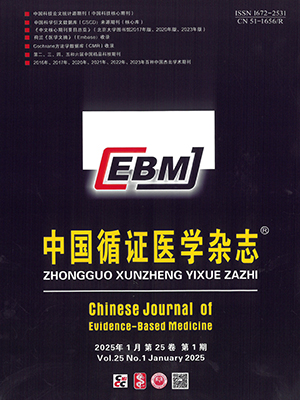| 1. |
中国研究型医院协会, 中国医师协会房颤专家委员会. 心房颤动外科治疗中国专家共识2020版. 中华胸心血管外科杂志, 2021, 37(3): 129-144.
|
| 2. |
GBD 2019 Diseases and Injuries Collaborators. Global burden of 369 diseases and injuries in 204 countries and territories, 1990-2019: a systematic analysis for the Global Burden of Disease Study 2019. Lancet, 2020, 396(10258): 1204-1222.
|
| 3. |
吴静静, 杨莉. 城市地区房颤脑卒中患者住院费用分析. 中国药房, 2013, 24(22): 2017-2020.
|
| 4. |
中华医学会心电生理和起搏分会, 中国医师协会心律学专业委员会, 中国房颤中心联盟心房颤动防治专家工作委员会. 心房颤动: 目前的认识和治疗建议(2021). 中华心律失常学杂志, 2022, 26(1): 15-88.
|
| 5. |
Sun Y, Zhu J, Ma C, et al. Stroke risk status, anticoagulation treatment, and quality-of-life in Chinese patients with atrial fibrillation: China Registry of Atrial Fibrillation (CRAF). Cardiovasc Ther, 2019, 2019: 7372129.
|
| 6. |
张景瑞, 李昌义, 马长生. 心房颤动节律控制时代如何用好抗心律失常药物. 中华内科杂志, 2021, 60(4): 289-293.
|
| 7. |
范长生, 王丽莉, 吴久鸿. 医保目录动态调整背景下完善创新药准入的思路探讨. 中国医疗保险, 2020, (5): 63-67.
|
| 8. |
Husereau D, Drummond M, Augustovski F, et al. Consolidated Health Economic Evaluation Reporting Standards 2022 (CHEERS 2022) statement: updated reporting guidance for health economic evaluations. Value Health, 2022, 25(1): 3-9.
|
| 9. |
Husereau D, Drummond M, Augustovski F, et al. Consolidated Health Economic Evaluation Reporting Standards (CHEERS) 2022 explanation and elaboration: a report of the ISPOR CHEERS II Good Practices Task Force. Value Health, 2022, 25(1): 10-31.
|
| 10. |
Willke RJ, Pizzi LT. CHEERS to updated guidelines for reporting health economic evaluations. Value Health, 2022, 25(1): 1-2.
|
| 11. |
Eckman MH, Falk RH, Pauker SG. Cost-effectiveness of therapies for patients with nonvalvular atrial fibrillation. Arch Intern Med, 1998, 158(15): 1669-1677.
|
| 12. |
Catherwood E, Fitzpatrick WD, Greenberg ML, et al. Cost-effectiveness of cardioversion and antiarrhythmic therapy in nonvalvular atrial fibrillation. Ann Intern Med, 1999, 130(8): 625-636.
|
| 13. |
Åkerborg Ö, Nilsson J, Bascle S, et al. Cost-effectiveness of dronedarone in atrial fibrillation: results for Canada, Italy, Sweden, and Switzerland. Clin Ther, 2012, 34(8): 1788-1802.
|
| 14. |
Nilsson J, Åkerborg Ö, Bégo-Le Bagousse G, et al. Cost-effectiveness analysis of dronedarone versus other anti-arrhythmic drugs for the treatment of atrial fibrillation-results for Canada, Italy, Sweden and Switzerland. Eur J Health Econ, 2013, 14(3): 481-493.
|
| 15. |
Berg J, Sauriol L, Connolly S, et al. Cost-effectiveness of dronedarone in patients with atrial fibrillation in the ATHENA trial. Can J Cardiol, 2013, 29(10): 1249-1255.
|
| 16. |
Reynolds MR, Nilsson J, Akerborg O, et al. Cost-effectiveness of dronedarone and standard of care compared with standard of care alone: US results of an ATHENA lifetime model. Clinicoecon Outcomes Res, 2013, 5: 19-28.
|
| 17. |
Tesic D, Kostic M, Paunovic D, et al. Analysis of the cost-effectiveness of dronedarone versus amiodarone, propafenone, and sotalol in patients with atrial fibrillation: results for Serbia. Kardiol Pol, 2015, 73(4): 287-295.
|
| 18. |
Kim M, Kim W, Kim C, et al. Cost-effectiveness of rate- and rhythm-control drugs for treating atrial fibrillation in Korea. Yonsei Med J, 2019, 60(12): 1157-1163.
|
| 19. |
Zhang M, Ren Y, Wang L, et al. Cost-effectiveness of dronedarone and amiodarone for the treatment of chinese patients with atrial fibrillation. Front Public Health, 2021, 9: 726294.
|
| 20. |
邢建生. 2种用药方案治疗心房颤动的成本-效果分析. 中国药房, 2008, (14): 1046-1047.
|
| 21. |
高胜男, 李雪靖, 刘国强. 国产盐酸决奈达隆片治疗阵发性/持续性房颤的成本-效果分析. 世界临床药物, 2021, 42(3): 202-207.
|
| 22. |
National Institute for Health and Care Excellence. Dronedarone for the treatment of non-permanent atrial fibrillation. Available at: https://www.nice.org.uk/guidance/ta197/resources/dronedarone-for-the-treatment-of-nonpermanent-atrial-fibrillation-pdf-82598561647045.
|
| 23. |
Canadian Agency for Drugs and Technologies in Health. Ablation procedures for rhythm control in patients with atrial fibrillation: clinical and cost-effectiveness analyses. Available at: https://www.cadth.ca/sites/default/files/pdf/H0491_Ablation_Procedures_with_Atrial_Fibrillation_tr_e.pdf.
|
| 24. |
Canadian Agency for Drugs and Technologies in Health. Dronedarone hydrochloride. Available at: https://www.cadth.ca/sites/default/files/cdr/complete/cdr_complete_Multaq_May-31-2010.pdf.
|
| 25. |
Institute for Clinical and Economic Review. Atrial fibrillation: an assessment of atrial fibrillation (AF), the most common cardiac arrhythmia in the US. Available at: http://icerorg.wpengine.com/wp-content/uploads/2020/10/Atrial-Fibrillation-Final-09-24-10.pdf.
|
| 26. |
Haute Autorité de Santé. CORDARONE 16092020 SUMMARY CT16356 18389. Available at: https://www.has-sante.fr/upload/docs/application/pdf/2021-03/cordarone_16092020_summary_ct16356_18389.pdf.
|
| 27. |
Haute Autorité de Santé. MULTAQ - CT 10281 - English version. Available at: https://www.has-sante.fr/upload/docs/application/pdf/2012-11/multaq_ct_10281.pdf.
|
| 28. |
Haute Autorité de Santé. RYTHMOL 16092020 SUMMARY CT16355 18390. Available at: https://www.has-sante.fr/upload/docs/application/pdf/2021-03/rythmol_16092020_summary_ct16355_18390.pdf.
|
| 29. |
Haute Autorité de Santé. SOTALEX 16092020 SUMMARY CT16396 18475. Available at: https://www.has-sante.fr/upload/docs/application/pdf/2021-03/sotalex_16092020_summary_ct16396_18475.pdf.
|
| 30. |
Hohnloser SH, Crijns HJ, van Eickels M, et al. Effect of dronedarone on cardiovascular events in atrial fibrillation. N Engl J Med, 2009, 360(7): 668-678.
|
| 31. |
马长生, 刘晓霞. 心房颤动进入节律控制时代. 中华心血管病杂志, 2021, 49(3): 205-206.
|
| 32. |
Kirchhof P, Camm AJ, Goette A, et al. Early rhythm-control therapy in patients with atrial fibrillation. N Engl J Med, 2020, 383(14): 1305-1316.
|
| 33. |
Cookson R, Griffin S, Norheim OF, et al. Distributional cost-effectiveness analysis comes of age. Value Health, 2021, 24(1): 118-120.
|
| 34. |
Cookson R, Mirelman AJ, Griffin S, et al. Using cost-effectiveness analysis to address health equity concerns. Value Health, 2017, 20(2): 206-212.
|
| 35. |
Avanceña ALV, Prosser LA. Examining equity effects of health interventions in cost-effectiveness analysis: a systematic review. Value Health, 2021, 24(1): 136-143.
|




